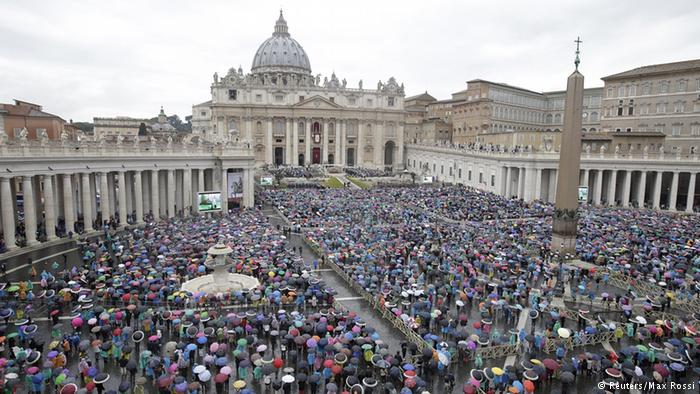Spreading Compassion and Forgiveness
April 6, 2018 | Expert Insights

Easter was celebrated by millions of people from around the world on April 1, 2018. At the heart of this religious holiday is a universal message about courage, love, sacrifice and forgiveness. After all, Jesus Christ’s sacrifice was for all of humanity and not only for Christianity.
Background
Easter, or Resurrection Sunday, is a Christian holiday celebrating the resurrection of Jesus Christ. Easter is described in the New Testament as having occurred on the third day of the burial of Jesus after crucifixion by the Romans at Calvary, a site immediately outside Jerusalem's walls, between AD 30 and 33. The festival is the culmination of the Passion of Jesus, preceded by Lent, a 40-day solemn religious observance of fasting, prayer, and penance.
Easter and the holidays related to it do not fall on a fixed date, but are moveable feasts. The week before Easter is referred to as "Holy Week" which contains the days of the Easter Triduum, including Maundy Thursday, commemorating the Maundy and Last Supper, as well as Good Friday, commemorating the crucifixion and death of Jesus.
In countries where Christianity is a state religion, or where the country has a large Christian population, Easter is often a public holiday. As Easter is always a Sunday, many countries in the world also have Easter Monday as a public holiday. Good Friday, which occurs two days before Easter Sunday, is also a public holiday in many countries, as well as in 12 US states. Even in states where Good Friday is not a holiday, many financial institutions, stock markets, and public schools are closed.
Analysis
Several religious and world leaders across the globe, such as Pope Francis, the President of the Philippines, and the Anglican Archbishop Glenn Davies sent out messages on Easter Sunday addressing the need to practice humility, compassion, and forgiveness.
Easter, although traditionally a Christian festival, is celebrated throughout the world across religions. It is commonly believed that Jesus Christ did not give his life just for those born to the Christian faith, but that his death was part of a divine plan to save all mankind.
"As we remember Christ's triumph against death, may we nurture humility and forgiveness in our hearts as these will free us from the shackles of hatred and greed. For it is only by being selfless that we can truly say we are worthy of God's love," Philippine President Rodrigo Duterte said in a statement.
"Let us make this occasion more meaningful by offering aid to others, especially to those in need. Let us pray for the welfare and safety of our countrymen and for lasting peace in our nation so that we can all work together in harmony towards real change," he said.
In his message on Sunday, Pope Francis called for peace in a world marked by war and conflict. He reiterated the need to end the “carnage” in “the beloved and long-suffering land of Syria.” He also urged “reconciliation” in the Middle East and requested for “the fruits of dialogue” to resolve tensions on the Korean Peninsula. He also noted the “hunger, endemic conflicts and terrorism” suffered by parts of Africa.
Addressing Sunday's congregation at Australia's St. Andrew's Cathedral, Anglican Archbishop Glenn Davies stated that the redemption of Easter gives hope of forgiveness to all who face moral failure. He encouraged the world to practice forgiveness stating that it should come naturally as forgiveness denotes eventual full restoration.
The present world, where politics is vindictive, with warmongers and business-mindedness on the rise, everything seems devoid of empathy and compassion. The murders of innocent people by soldiers, the act of planting a bomb, exploiting workers in slave labor, torture, rape, violence, and other kinds of abuse can be attributed to a lack of empathy and compassion for other living beings.
The Easter messages celebrated Jesus of Nazareth’s true gift of His heightened empathy and compassion for his fellow human beings, which He expressed freely without prejudice or discrimination. “Jesus could see through harmful behavior to the inner pain of the sinner and, feeling compassion for their heartache, could then extend forgiveness, pardon without punishment, in the warm embrace of grace and mercy,” stated Diane Priestley, a journalist and community worker in East Africa.
Pope Francis emphasized that the connection and reconciliation with God leads to repentance or re-thinking life. A change in thinking, emotions and actions results in Redemption; the transformation to goodness and the beginning of cultivating compassion.
To know more of the Pope’s message: Pope Francis says protect the ‘defenseless’
Assessment
Our assessment is that most of the atrocities in the world happen because of lack of empathy and compassion, especially among global leaders and statesmen. In a world that seems filled with hatred, a single act of kindness will be acknowledged by millions of people. Love, forgiveness, and compassion should be seen as the religion of the world, which will have an everlasting impact on society.








Comments